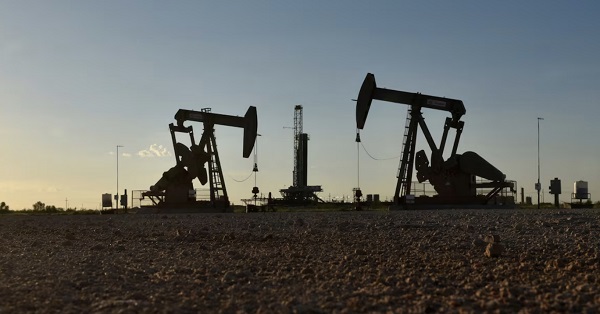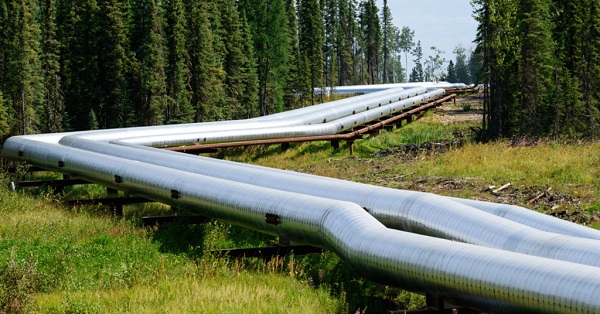Dan McTeague
Ottawa’s intentional destruction of western wealth

From Canadians for Affordable Energy

Even if it fails to hit its emissions targets (which it will,) the economic consequences of enacting this plan are very serious. It would make Canada the only country in the world which willingly and purposefully stifles its single largest revenue stream.
At this point, everyone in Canada has heard about the Carbon Tax and had a chance to experience its negative effects. But less has been said about another harmful policy dreamed up by the Trudeau government — the Emissions Cap on the oil and gas sector. Just like the Carbon Tax, the Emissions Cap is part of Trudeau’s larger program to try and achieve “Net Zero” greenhouse gas (GHG) emissions by 2050, which will have no positive impact on the environment, but which will be ruinous to Canada’s natural resource sector and to the national economy.
In their 2021 platform, the Liberals made a commitment to “cap and cut emissions from the oil and gas sector” and proclaimed that that industry must reduce emissions “at a pace and scale needed to achieve net-zero by 2050.” As promised, in December 2023 the Trudeau government proposed an Emissions Cap to reduce GHG emissions in the oil and gas sector by 42 percent by 2030. Keep in mind Canada contributes only 1.5% of global emissions, so this plan, even if accomplished, would reduce global emissions by less than one half of one percent.
Even if it fails to hit its emissions targets (which it will,) the economic consequences of enacting this plan are very serious. It would make Canada the only country in the world which willingly and purposefully stifles its single largest revenue stream. After all, the oil and gas industry generates $45 billion per year in annual economic activity, and contributes $170 billion per year to the GDP.
But don’t take my word for it. According to a Deloitte report commissioned by the Government of Alberta, an Emissions Cap would lead to a 10% decrease in Alberta’s oil production and a 16% decrease in conventional natural gas production. Fossil fuel production would decrease in B.C., Saskatchewan, and Newfoundland as well. Other industries connected to the oil and gas sector such as the mining, refinery products, and utilities are also expected to be impacted and will experience a decrease in output in Alberta and the rest of Canada.
The report goes on to state that in 2040 “Alberta’s GDP is estimated to be lower by 4.5% and Canada’s GDP by 1.0% compared to the baseline.”
It notes that because it is assumed that “the Cap is a permanent measure, the shift in the output of the oil and gas sector and associated losses are permanent and accumulate over time. Cumulatively, over the 2030 to 2040 period, we estimate that real GDP in Alberta is $191 billion lower and real GDP in the Rest of Canada is $91 billion lower, compared to the baseline scenario ($2017 dollars).”
Of course, the environmentalists will crow that the oil and gas industry is dying anyway and the demand for oil and gas around the world is slowly decreasing, but this is simply not true.
Global demand for oil and gas is only growing and will continue to do so. According to the report, “Based on current policy and before the impact of the Cap, we expect: Oil production in Canada to increase by 27% by 2030 and 32% by 2040 from 2021 levels; and Gas production in Canada to increase by 10% by 2030 and 16% by 2040 from 2021 levels.”
And this isn’t the only study which projects negative outcomes from this policy. The Montreal Economic Institute (MEI) released a study which describes how the Trudeau government’s proposed Emissions Cap for the energy sector would “cost the Canadian economy between $44.8 billion and $79.3 billion a year” and would “cause substantial losses, without achieving any net reduction in global emission.”
You can read the study here.
Plus it is worth noting that this emissions cap will result in “substantial losses without achieving any net reduction in global emissions.”
Why? Because of the increase in global demands for oil and gas, we can either produce those resources here or get them from another country that has no environmental, much less labour standards, such as Russia, Venezuela, and Iran.
To add insult to injury for the oil and gas producing provinces, and as I’ve pointed out in the past, this cap on emissions would apply only to the oil and gas sector. This emissions cap would not apply to the concrete industry, the automotive industry, or the mining industry. And — surprise surprise — it certainly won’t apply to Montreal’s lucrative jet-building industry.
But take heed: this isn’t simply an Alberta issue. This is a Canadian issue and one that everyone in Canada should be concerned about.
The umbrella of Net Zero by 2050 is large and far reaching, and an emissions cap is simply one part of a multi-layered attack on our economy and way of life. Carbon taxes, layered on top of a Clean Fuel Standard, layered on top of pipeline blockages, layered on top of Bills C-48 and C-69, preventing oil from being shipped from other parts of the world — will run counter to our national interests, and endanger the Canadian way of life for generations to come.
If Canadians are now vehemently opposed to carbon taxes, as we suggested would be the case half a dozen years ago, wait for this unnecessary burden to befall them.
In the words made famous by the Canadian rock legend BTO, “You ain’t seen nothing yet!”
Dan McTeague is President of Canadians for Affordable Energy.
Dan McTeague
Will this deal actually build a pipeline in Canada?

By Dan McTeague
Will Carney’s new pipeline deal actually help get a pipeline built in Canada? As we said before, the devil is in the details.
While the establishment and mainstream media cheer on the new pipeline agreement, there are specific details you need to be aware of.
Dan McTeague explains in his latest video.
Business
Liberal’s green spending putting Canada on a road to ruin

Once upon a time, Canadians were known for our prudence and good sense to such an extent that even our Liberal Party wore the mantle of fiscal responsibility.
Whatever else you might want to say about the party in the era of Jean Chrétien and Paul Martin, it recognized the country’s dire financial situation — back when The Wall Street Journal was referring to Canada as “an honorary member of the Third World” — as a national crisis.
And we (remember, I proudly served as Member of Parliament in that party for 18 years) made many hard decisions with an eye towards cutting spending, paying down the debt, and getting the country back on its feet.
Thankfully we succeeded.
Unfortunately, since then the party has been hijacked by a group of reckless leftwing fanatics — Justin Trudeau and his lackeys — who have spent the past several years feeding what we built into the woodchipper.
Mark Carney’s finally released budget is the perfect illustration of that.
The budget is a 400 page monument to deficit delusion that raises spending to $644.4 billion over five years — including $141.4 billion in new spending — while revenues limp to $583.3 billion, yielding a record (non-pandemic) $78.3 billion shortfall, an increase of 116% from last year.
This isn’t policy; it’s plunder. Interest payments alone devour $55.6 billion this year, projected to hit $76.1 billion by 2029-30 — more than the entire defence budget and rising faster than healthcare transfers.
We can’t discount the possibility that this will lead to a downgrade of our credit rating, which will significantly increase the cost of borrowing and of doing business more generally.
Numbers this big start to feel very abstract. But think of it this way: that is your money they’re spending. Ottawa’s wealth is made up entirely of our tax dollars. We’ve entrusted that money to them with the understanding that they will use it responsibly. In the decade these Liberals have been in power, they have betrayed that trust.
They’ve pursued policies which have made life in Canada increasingly unaffordable. For example, at the time of writing it takes 141 Canadian pennies (up from 139 a few days ago) to buy one U.S. dollar, in which all of our commodities are priced. Well, that’s .25 cents per litre of gasoline. Imagine what that’s going to do to the price of heating, of groceries, of the various other commodities which we consume.
And this budget demonstrates that the Carney era will be more of the same.
Of course, the Elbows Up crowd are saying the opposite — that this shows how fiscally responsible Mark Carney is, unlike his predecessor. (Never mind that they also publicly supported everything that Trudeau did when he was in government.) They claim that Carney shows that he’s more open to oil and gas than Trudeau was.
Don’t believe it.
The oil and gas sector does get a half-hearted nod in the budget with, for instance, a conditional pathway to repeal the emissions cap. But those conditions are important. Repeal is tied to the effectiveness of Carney’s beloved industrial carbon tax. If that newly super-charged carbon tax, which continues to make our lives more expensive, leads to government-set emissions reductions benchmarks being met, then Ottawa might — might — scrap the emissions.
Meanwhile, the budget doubles down on the Trudeau government’s methane emissions regulations. It merely loosens the provisions of the outrageous Bill C-59, an act which should have been scrapped in its entirety. And it leaves in place the Trudeaupian “green” super structure, which has resource sector investment, and any business that can manage it, fleeing to the U.S.
In these perilous times, with Canada teetering on the brink of recession, a responsible government would be cutting spending and getting out of the way of our most productive sectors, especially oil and gas — the backbone of our economy.
It would be repealing the BC tanker ban and Bill C-69, the “no more pipelines act,” so that our natural resources could better generate revenue on the international market and bring down energy rates at home.
It would quit wasting millions on Electric Vehicle charging stations; mandating that all Canadians buy EVs, even with their elevated cost; and pressuring automakers to manufacture Electric Vehicles, regardless of demand, and even as they keep closing up shop and heading south.
But in this budget the Liberals are going the opposite direction. Spend more. Tax more. Leave the basic Net-Zero framework in place. Rearrange the deck chairs on the Titanic.
They’re gambling tomorrow’s prosperity on yesterday’s green dogma, And every grocery run, every gas fill-up, every mortgage payment will serve as a daily reminder that we are the ones footing the bill.
Once upon a time, the Liberals knew better. We made the hard decisions and got the country back on its feet. Nowadays, not so much.
-

 Business2 days ago
Business2 days agoLoblaws Owes Canadians Up to $500 Million in “Secret” Bread Cash
-

 Focal Points2 days ago
Focal Points2 days agoCommon Vaccines Linked to 38-50% Increased Risk of Dementia and Alzheimer’s
-

 Business1 day ago
Business1 day agoThe EU Insists Its X Fine Isn’t About Censorship. Here’s Why It Is.
-

 Dan McTeague2 days ago
Dan McTeague2 days agoWill this deal actually build a pipeline in Canada?
-

 Business21 hours ago
Business21 hours agoCanada invests $34 million in Chinese drones now considered to be ‘high security risks’
-

 Economy21 hours ago
Economy21 hours agoAffordable housing out of reach everywhere in Canada
-

 Censorship Industrial Complex2 days ago
Censorship Industrial Complex2 days agoUS Condemns EU Censorship Pressure, Defends X
-

 Banks2 days ago
Banks2 days agoTo increase competition in Canadian banking, mandate and mindset of bank regulators must change






